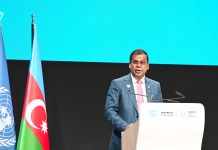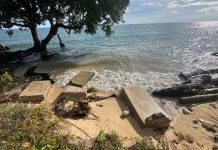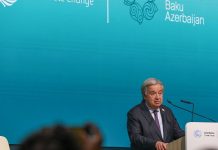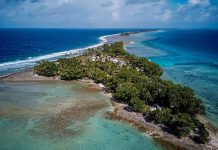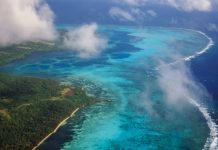Op-ed by Bo Li and Marshall Mills
Pacific Island countries are renowned the world over for their unique geography, populations, cultures, and way of life. This uniqueness presents myriad opportunities to boost growth and wellbeing. It also exposes these countries to distinctive challenges. For the past three decades, the IMF has been engaged in the Pacific Islands region on economic policies through policy advice, financing, and capacity development. Looking ahead, we are stepping up this engagement and deepening our partnership so these countries can harness the opportunities of the future and confront their challenges.
Over the past three years, the Pacific Island Countries (PICs) have been struck by a succession of big shocks: Covid-19 pandemic, international border closures, commodity price volatility, and natural disasters. Indeed, for many PICs, climate change is an existential challenge, which can be complicated by longer-term trends such as emigration and loss of correspondent banking relations. And the toll has been heavy: lower growth, higher fiscal deficits, and rising public debt.
Keenly conscious of these challenges, the IMF is intensifying its support of PICs along three key dimensions: deepening our engagement, fostering knowledge sharing, and scaling up financial support for tackling climate change. Greater collaboration with the region’s partners is central to these efforts.
Deeper engagement
This year marks the 30th anniversary of our Pacific Financial Technical Assistance Center (PFTAC). PFTAC was the IMF’s first regional centre for technical assistance in the world, and the model has now been replicated in 17 different locations. Hosted in Fiji, this centre is critical in expanding the IMF’s engagement in the region, and in aligning countries’ capacities with our stepped-up efforts to provide timely and tailored policy advice.
These efforts have been instrumental in bolstering macroeconomic frameworks across PICs. From strengthening tax administration in Palau, to integrating climate considerations into fiscal frameworks in Samoa and enhancing investment management in Timor-Leste and Kiribati.
We are also inaugurating a new Resident Representative Office in Papua New Guinea connected to US$918 million in financial assistance to support the authorities’ reforms to enhance inclusive growth and address debt sustainability and governance concerns. This follows quick-disbursing emergency financial support during the pandemic shutdowns to Papua New Guinea, Samoa, Solomon Islands and Tonga.
Fostering peer learning
Experience is often the best teacher. Sharing hard-earned policy lessons among PICs facing similar challenges has been at the heart of PFTAC’s activities since inception. This time we are going further. Our regional conference in Nadi this week will bring together peers and senior policymakers in the Caribbean and the Executive Secretary of the UN Framework Convention on Climate Change (UNFCCC) to share their experiences in climate action, digitalisation, and correspondent banking relations.
Regional solutions for climate adaptation and digital money being developed in the Caribbean region could provide invaluable lessons for the Pacific Islands. Similarly, new initiatives being considered in the Pacific region, such as safe payments corridors, could potentially be explored for other small states. Learning from innovative and successful policies elsewhere can save countries time and help customize solutions for the specific circumstances of small island states.
Scaling up climate finance
We are keenly aware that PICs are at the frontlines of climate change – even though they have contributed the least to global emissions. Climate adaptation needs for the PICs are enormous, while access to climate finance is slim. And in some island countries, additional finance is also needed to transition to renewables, which could reduce fuel imports and promote growth.
The IMF estimates investment needs for climate-proofing infrastructure in PICs can range between 6.5 and 9 percent of GDP annually. So, there is an urgent need to scale up climate financial support.
Pacific Island countries, in collaboration with the IMF, development partners, and donors, are exploring concrete and collaborative mechanisms to boost climate finance. This week’s conference will include a roundtable discussion on how to ramp up collective efforts to bolster the region’s resilience and overcome capacity and resource constraints.
The IMF is ready to do its part. To help countries confront long-term threats like climate change, it has created a new Resilience and Sustainability Facility (RSF), which can provide concessional lending to all PICs. The RSF can catalyse more financing from official and private sector sources by signaling policy commitment and supporting a conducive environment for investment. For instance, in Barbados, the RSF created fiscal space to establish a new Blue Green Bank to finance climate-resilient projects like storm-resistant homes, in partnership with the Green Climate Fund.
Partnership for the future
The future for Pacific Islands holds much promise provided we rise together to the challenges they face. But as demonstrated by the ground-breaking success of PFTAC, the power of innovation, collaboration, and determination can deliver on this promise. Let us reassure you that the IMF will continue to deepen its engagement to support you.
Bo Li is the Deputy Managing Director at the International Monetary Fund. He is responsible for the IMF’s work on about 90 countries as well as on a wide range of policy issues.
Marshall Mills heads the Pacific Islands Division at the International Monetary Fund’s Asia and Pacific Department. He is also the mission chief for Fiji.



